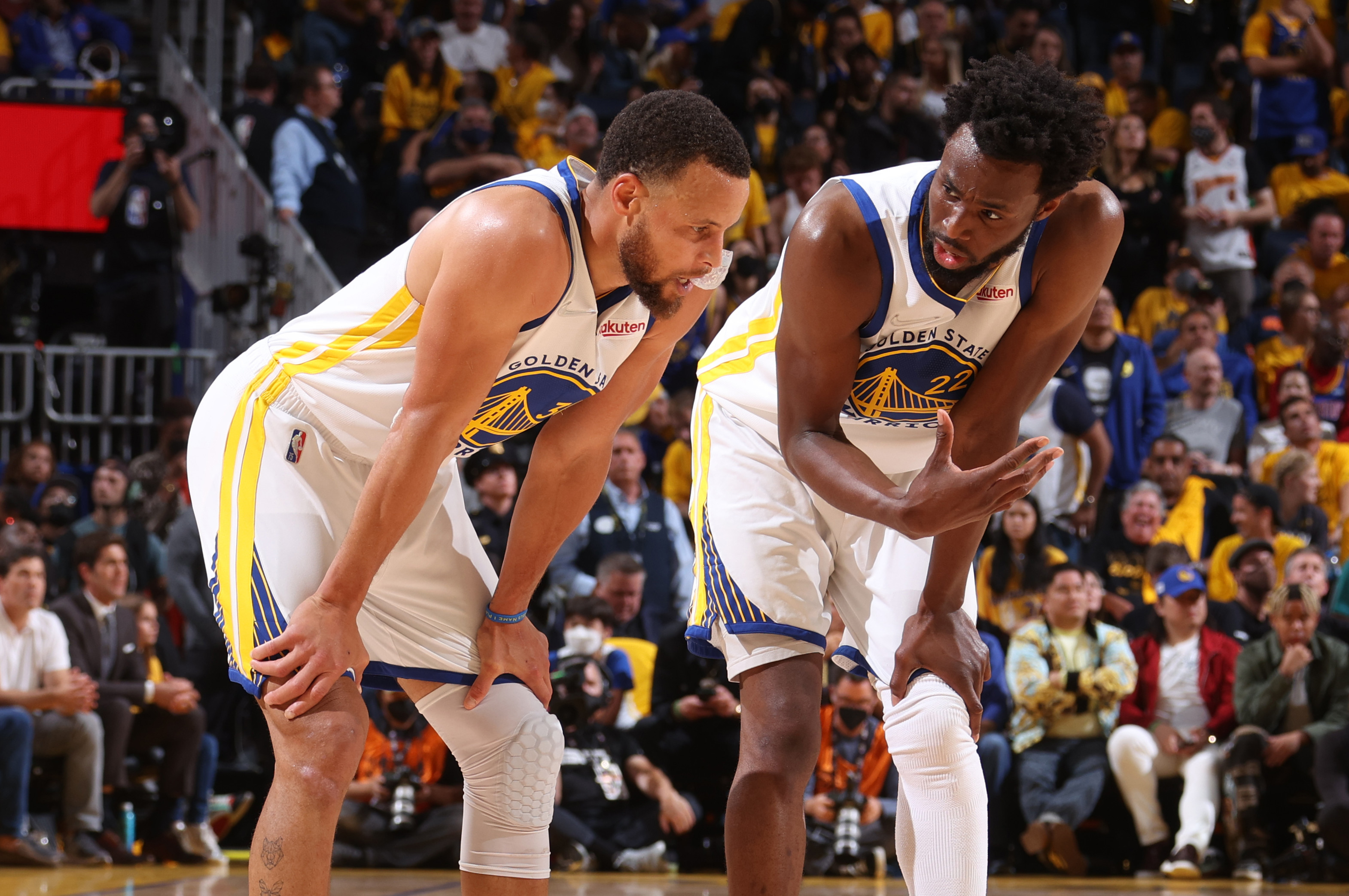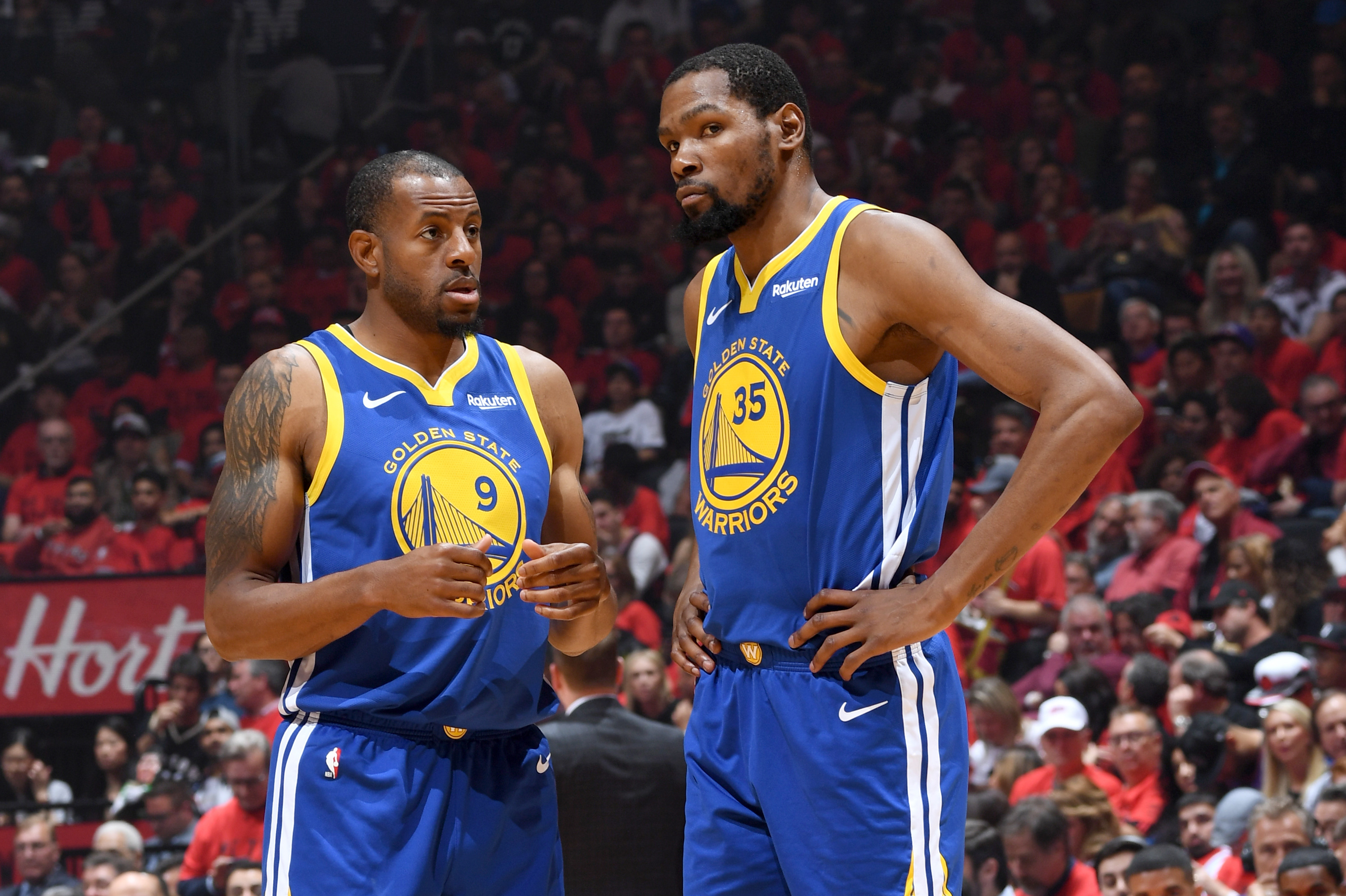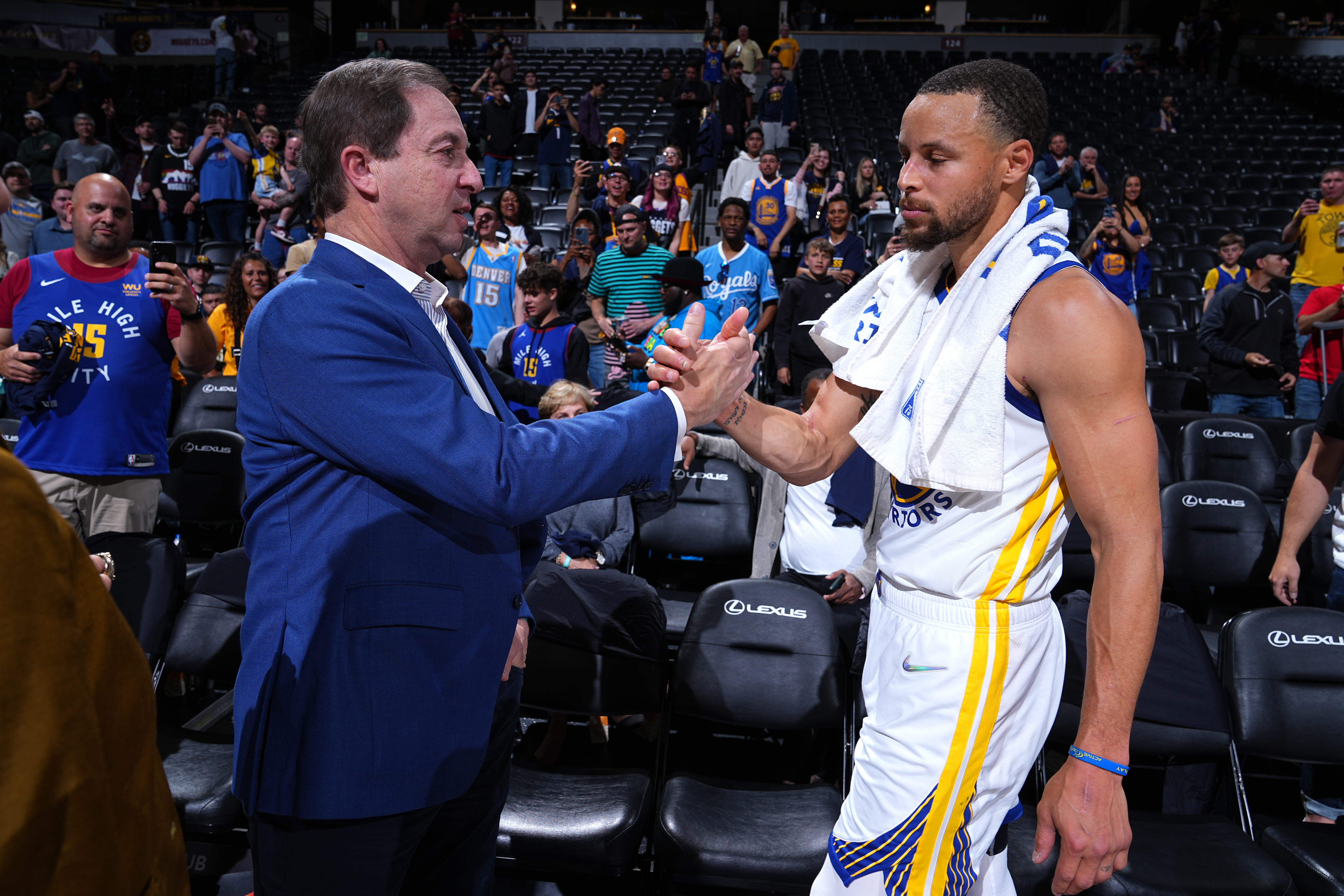Featured Video
Final Inside the NBA on TNT

No, the Golden State Warriors' 2022 NBA Finals Run Is Not Unfair
The 2021-22 Golden State Warriors are a lot of things: absurdly good, one win away from another NBA championship, an extension of a dynasty many thought dead, made possible by Stephen Curry, more than just Stephen Curry, incredibly expensive, etc.
What these Warriors are not, however, is unfair. Nor are they solely the byproduct of a willingness from Joe Lacob, Peter Guber and other team governors to spend and spend and spend.
This apparently needs to be said, if not explicitly spelled out in a slow and exaggerated drawl. Because mere moments after the Warriors dispatched the Boston Celtics in Game 5 of the NBA Finals, the conversation shifted ever so slightly from the defining performance delivered by Andrew Wiggins, the team's overall mettle and its implications for Thursday's Game 6 to, quite literally, dollars and cents.
TOP NEWS

Tom Thibodeau Says Knicks Have 'Big Offseason' Ahead After ECF Loss to Pacers

Pacers' Pascal Siakam Named 2025 Eastern Conference Finals MVP After Win vs. Knicks

Naz Reid, Ty Jerome and 2025 NBA Free Agents About To Get a Raise
"Andrew Wiggins...he's not an underdog," ESPN's Brian Windhorst said on SportsCenter. "He makes $32 million. While the Warriors were down these last couple of years, winning no games, they kept spending money because they've got it. They re-signed Draymond Green. They re-signed Steph Curry. They re-signed Kevon Looney. They kept Andrew Wiggins. And boy, did it show up tonight.
"Andrew Wiggins, with a supreme moment in his career. He was a throw-in in a trade. Other teams would've totally gotten rid of him. They stuck with him. They have a $340 million payroll when you consider taxes. You don't just have to beat the Warriors on the court. You gotta beat their checkbook. And nothing away from Andrew Wiggins tonight, but this was a checkbook win for the Warriors."
Twitter is #PrettyPissed about this slant—not just Warriors fans, but the NBA intelligentsia in general. Just peruse the quote tweets. And, well, the outrage is warranted.
Sure, gesturing toward the Warriors' payroll isn't necessarily out of line. They are set to pay around $346.2 million for their roster after baking in the repeater tax. That is...a crap ton of money, and it's around $81 million higher than the league's second-most expensive cap sheet, belonging to the Brooklyn Nets.
It also isn't only Windhorst who speaks about the Warriors in these terms. It is a school of thought to which general manager Bob Myers has been asked to respond during these NBA Finals.
"I mean, we drafted a lot of these guys, we developed them," he said during a recent appearance on 95.7 The Game's The Morning Roast (h/t Sam Quinn of CBS Sports). "It's not like we went out and signed all these guys as free agents and built some team that way. Larry Riley's the guy that drafted [Stephen] Curry, I was here when we drafted Klay [Thompson], we drafted Draymond [Green], we drafted [Jordan] Poole, we traded for Wiggins. Nobody wanted Wiggins, I mean nobody was saying anything then."
Cue the "BuT wHaT aBoUt KeViN dUrAnT?!?" rebukes. And, look, technically those aren't out of pocket, either. The Warriors in 2016 added a top-15 player of all time still in his prime to a core that just rattled off an NBA-record 73 victories and already bagged one championship (2015).
How is that fair?
Conceptually, it's not. In practice, though, the Warriors didn't cheat the system, get granted an exception for a top-five superstar without cap space or even employ the art of witchcraft. They were in a position to sign KD because the league infused all of its new TV money into the salary cap at once rather than bake it in over time.
Unprecedented circumstances enabled what they became.

It is also true the Warriors wouldn't have landed D'Angelo Russell or, by extension, Wiggins, without KD, who they signed and traded to Brooklyn in 2019. Big. Freaking. Whoop. Golden State still needed to finagle itself within the confines of the hard cap to make that happen, which materially impacted its roster and asset chest. And like Myers said, "nobody" was irate that they turned KD into draft equity and someone widely considered to be on one of the league's worst contracts.
Any issue with the Warriors' spending is actually an attempt to deflect scrutiny away from other franchises that aren't doing the same, which is complete and utter B.S.
No team is prohibited from drafting players so good that their second, third and fourth contracts combine to dramatically inflate the payroll and trigger more punitive luxury taxes. This idea that franchises in a similar situation, inasmuch as one even exists, can't pay those subsequent contracts is a myth.
This is not an issue of ability. It's a matter of willingness.
Feel free to cite the disadvantages of smaller markets. Location limitations are a separate dilemma, a problem that warps the opportunity to acquire stars outside the draft. NBA teams are operated by the ultra-rich and worth billions. The Memphis Grizzlies closed 2021 as the "cheapest" organization on Forbes' list of franchise valuations and still came in at an estimated $1.5 billion.
The Warriors, no doubt, are willing to spend record amounts on payroll and luxury taxes because of the profits they stand to glean from Chase Center. So, um, maybe more teams should try privately financing arenas rather than banking on public funds?
In some ways, this might be an oversimplification of how the Warriors compare to the rest of the league. But it is far more logical than the aspect of fandom in which we're conditioned to care about how on earth billionaires can afford certain roster moves.
The actually-applied-for-a-government-backed-small-business loan Los Angeles Lakers didn't need lowball Alex Caruso in free agency last summer. The Milwaukee Bucks have the league's fourth-highest luxury-tax bill and still could have re-signed P.J. Tucker over the offseason.
Sometimes, it really is this simple.
For the Warriors specifically, though, it's more complicated.
Their success can't exclusively be boiled down to deep pockets. Their spending has, to some degree, been its own obstacle. Given how much time Klay Thompson missed and the topsy-turviness of Draymond Green's offense, their current deals are not, without question, net-positive assets.
Golden State has still needed to mine success on the margins. It probably wouldn't be here without Gary Payton II and Otto Porter Jr., both of whom are on minimum deals. It most certainly wouldn't be here without Kevon Looney, who re-signed on a three-year, $14.5 million in 2019 and was seldom considered a bargain through the first two seasons when he missed a combined 66 games.
And just to get out in front of this: The Warriors also aren't here, on the precipice of another title, thanks to some generally inaccessible, stroke-of-genius gap year. They arguably whiffed on what should be the best asset to come out of the past two seasons, the No. 2 pick in 2020. James Wiseman remains very much a mystery, but that's only because he's made a combined 39 appearances through two years.
Bagging Jonathan Kuminga with the No. 7 pick in 2021 looks like a home run. But the Warriors only have him because the Minnesota Timberwolves coveted D'Angelo Russell and, much like the rest of the league, were over the Andrew Wiggins experience. Should we ban Golden State from making trades? Or from getting lucky?
None of this is meant to suggest the Warriors' governorship group is made of Teflon or deserves to be placed atop a pedestal. There are limits to even their spending.

They opted against using the mini mid-level exception just last summer. It ended up working out because they stumbled into GP2, OPJ, Andre Iguodala and Nemanja Bjelica. If they went belly up because they didn't sign another conventional big or spend more on a wing, they would be subject to their own trip under the microscope.
The same will hold true if they draw a line this offseason when Looney hits free agency and Jordan Poole is extension-eligible. Refusing to pay either—or making other moves to cut costs and then pay them—would be a choice, not a mandate.
More than anything, this entire discussion aims to emphasize the total inanity of the "checkbook win" slant. Framing any part of this Warriors Finals run in those terms takes away what's actually happening.
Curry is still a top-five player at the age of 34. Wiggins has transformed amid a more optimized role and better organizational stability. Poole, despite a rougher go in the Finals, has developed into someone Golden State must value like a cornerstone.
Looney has gone from oft-injured and playing in shorter spurts to the third-best Warriors player in a damn Finals series. Thompson is back after nearly 1,000 days away from the floor. The Warriors, like the Celtics, are defensive hellfire.
And in the face of some lopsided quarters and games, this Finals matchup is a riveting head-to-head of two equals going adjustment-for-adjustment, potentially on a collision course for an epic Game 7.
Yes, at various points over the past eight years, the Warriors have played—and won—with an inevitability that feels unfair. Such is the plight of a dynasty, particularly one that, for so long, stripped the race to the NBA Finals of its mystery.
News flash, though: No matter how good the Warriors have been and continue to be, they are not unfair. And they most certainly did not have a "checkbook win."
They are here for a multitude of reasons, including luck. But mostly, they're here because they are fortunate to have, and were smart enough to keep or acquire, really good players.
Suggesting otherwise? Now that's unfair.
Unless otherwise noted, stats courtesy of NBA.com, Basketball Reference, Stathead or Cleaning the Glass. Salary information via Spotrac.
Dan Favale covers the NBA for Bleacher Report. Follow him on Twitter (@danfavale), and listen to his Hardwood Knocks podcast, co-hosted by NBA Math's Adam Fromal.






